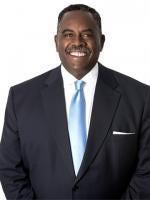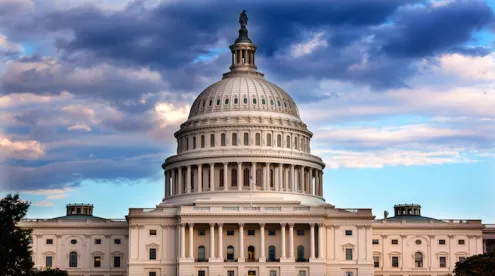Last night, Republicans won a majority in the U.S. Senate and increased their majority in the House of Representatives. Republicans will control both bodies in Congress for the first time since 2006, which will have a significant impact on financial services policymaking and regulatory oversight on Capitol Hill, including the first real prospect of changes to the Dodd-Frank Wall Street Reform and Consumer Protection Act (P.L. 111-203, Dodd-Frank), five years after the landmark legislation was enacted.
Possible changes to Dodd-Frank include:
-
Shifting the Consumer Financial Protection Bureau (CFPB) from a single director driven agency to one led by a bi-partisan commission;
-
Clarifying that the Federal Reserve Board can apply insurance-based capital standards to the insurance portion of any insurance holding company it oversees;
-
Lifting the threshold for automatically designating banks, particularly regional banks, as “systemically important financial institutions” (SIFIs) subject to enhanced prudential supervision;
-
Exempting end users or non-financial companies from putting up cash reserve on derivatives trades;
-
Paring back the Volcker rule that bans bank proprietary trading; and
-
Loosening the definition of points and fees under the Qualified Mortgage Rule
Very Different Financial Services Outlook for 114th Congress
During the 113th Congress, House Republicans, led by Financial Services Committee Chairman Jeb Hensarling (R-TX), introduced and passed a number of bills making changes to Dodd-Frank. However, the Democratic majority in the Senate, following the White House’s lead, blocked these and other attempts to revise Dodd-Frank, with the exception of a bi-partisan bill to allow the Federal Reserve more flexibility in its regulation of the insurance industry.
The potential outlook for the 114th Congress is very different. Both the House Financial Services Committee and the Senate Banking Committee will be led by Republicans who share conservative views on the importance of free enterprise and limiting government intervention in the capital markets. With Republicans controlling the committees’ agendas, there will be aggressive oversight of Dodd-Frank regulators in both chambers, and it is expected that bi-cameral legislation changing provisions of Dodd-Frank will be sent to the President.
Shelby likely to Chair Senate Banking Committee
Sen. Richard Shelby (R-AL) will likely become Chairman of the Senate Banking Committee for the 114th Congress. A former Democrat, Shelby will be a moderating force against his more ideological counterpart in the House, Rep. Hensarling. This dynamic will be essential to breaking the political gridlock of financial services legislation in the 114th Congress. Senate Republicans will not have a “filibuster-proof majority” in the Senate and will need the support of moderate Senate Democrats to pass most bills. Under Senate Republican rules for committee leadership, Shelby will only have two years to serve as chairman because he previously served as the panel’s chair for four years (2003-2007). Thus, Shelby is likely to pack a lot into his agenda to leave his mark on the committee.
Sen. Chuck Schumer (D-NY) or Sen. Sherrod Brown (D-OH) will likely take over as Banking Committee Ranking Member. Schumer has greater seniority, but he may decline the opportunity to serve as Ranking Member in order to seek a higher position in the Senate Democratic leadership. While Sens. Jack Reed (R-RI) and Robert Menendez (D-NJ) also serve on the Banking Committee and outrank Brown in seniority, Reed is expected to become Ranking Member of the Armed Services Committee, and Menendez is expected to retain his position as the top Democrat on the Foreign Relations Committee, which leaves Brown next in line to become Ranking Member.
Democratic support in the Senate will be needed to pass changes to Dodd-Frank
The Senate Democratic leadership is generally opposed to reopening Dodd-Frank and will likely take advantage of Senate procedural rules that require 60 votes to shut off debate and force a vote on legislation to try to block Republican changes to the law. As a result, Republicans will require Democratic support in the Senate to pass most, if not all, changes to Dodd-Frank. However, there are currently Senate Democrats who believe that some changes to Dodd-Frank are warranted. They will use the 60-vote threshold as leverage to moderate Republican changes to Dodd-Frank in exchange for their support to end debate.
Hensarling expected to continue as House Financial Services Committee Chair
In the House, Rep. Frank Lucas (R-OK), who is term limited under House Republican rules from his position as Agriculture Committee Chairman, is considering a challenge to Hensarling for the Chairmanship of House Financial Services Committee. Lucas is best known for shepherding a bipartisan Farm Bill through the House last year and will be appealing to moderate Republicans in leadership to hand him the Financial Services Committee gavel.
However, fresh off the campaign trail, Republican conservatives will be looking for a friendly voice in the House Leadership and have been pressuring Hensarling to seek a position. If leaders grant Lucas the Financial Services Committee gavel, it will free Hensarling to make a formidable challenge for Majority Whip. Moreover, forcing Hensarling out of the Financial Services Committee Chair could have a domino effect of displacing chairmen in other committees. Therefore, Hensarling is expected to continue as Chairman of the Financial Services Committee, and Rep. Maxine Waters (D-CA) will maintain her position as Ranking Member.
Hensarling and Shelby likely to seek Dodd-Frank changes that most think are necessary
Hensarling and Shelby are likely to try to enact changes to Dodd-Frank that are supported by the financial services industry and Republicans and Democrats in Congress. For example, the autocephalous structure of the CFPB goes even further than Sen. Elizabeth Warren (D-MA), the CFPB’s creator, envisioned. Particularly, both Republicans and Democrats have concerns that continued leadership by a single politically-appointed director will result in wide swinging policy changes between Democratic and Republican administrations. As a result, Hensarling and Shelby will likely work together to move legislation through the House and the Senate to change the CFPB from a single director driven agency to one led by a bi-partisan commission. Also under debate will be whether the CFPB should continue to be funded independently by the Federal Reserve or whether it should have the same funding oversight as every other federal agency, which requires a congressional appropriation.
Other changes to Dodd-Frank that Hensarling and Shelby could pursue together include the following: clarifying that the Federal Reserve Board can apply insurance-based capital standards to the insurance portion of any insurance holding company it oversees; lifting the threshold for automatically designating banks, particularly regional banks, as SIFIs subject to enhanced prudential supervision; adjusting which banks count as “rural” and are therefore exempted from certain rules; changing the Financial Stability Oversight Council’s process for designating non-banks as SIFIs; exempting end users or non-financial companies from putting up a cash reserve on derivatives trades; paring back the Volcker rule that bans bank proprietary trading; and loosening the definition of points and fees under the Qualified Mortgage Rule.
President Obama could veto Dodd-Frank changes or negotiate compromises with Republicans
President Obama could veto any changes to Dodd-Frank passed by Congress. For example, he has said he will veto any bill that replaces the director or the funding of the CFPB. But, with only two years remaining in his administration, the President must balance using his veto pen and negotiating compromises to get things done. Whether the President decides to exercise his veto authority or compromise with Republicans will depend on the particular change to Dodd-Frank, the gap between Republican and White House positions, and if the President views a veto or a compromise as more important to his legacy.
The President’s decision could also be influenced by the legislative vehicle chosen by Republicans. For example, Republicans could try to insert changes to Dodd-Frank in the annual financial services appropriations bill, or simply reduce the amount of funding in the bill relevant to the Dodd-Frank provisions they oppose. Depending upon the particular Dodd-Frank issue, the President may choose not to veto the appropriations legislation because doing so would risk shutting down federal agencies (as occurred in 2013).
Hensarling and Shelby will hold hearings and consider legislation on other issues
In addition to Dodd-Frank, Hensarling and Shelby are likely to hold oversight hearings on the following issues: autonomy of the Federal Reserve given its expanded authorities; changes in mortgage lending requirements implemented by the Federal Housing Finance Agency (FHFA) under the leadership of former Congressman Mel Watt; and CFPB audits and investigations.
The Financial Services and Banking Committees are also likely to consider a number of other important pieces of legislation including: housing finance reform (future of Fannie Mae and Freddie Mac); reform of the Federal Housing Administration (FHA); reauthorization of the Export-Import Bank; reauthorization of Terrorism Risk Insurance Act; and changes to student loan financing
Conclusion
Sen. Shelby and Rep. Hensarling have had a number of discussions about what they would like to achieve for financial services legislation and regulatory oversight in the 114th Congress. With Republicans in control of both chambers of Congress for the first time in many years, changes are emerging for legislative “fixes” to Dodd-Frank. These changes range from bi-partisan fixes that most think are necessary to more severe and ideological changes that will likely face a potential veto by the President.




 />i
/>i
